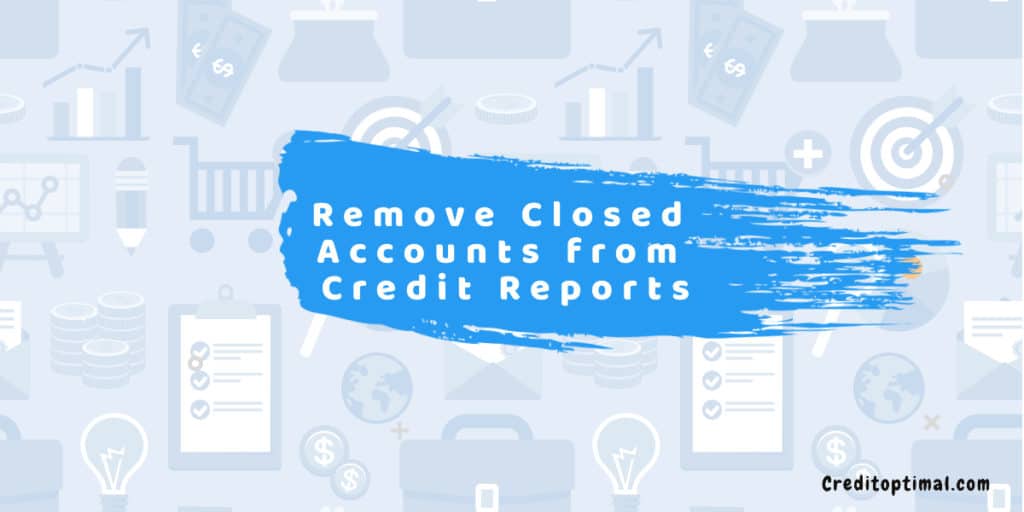Closing a credit account isn’t a guarantee that it will automatically drop from your credit report.
You might perceive that closing a credit card account would eliminate it from your credit report, but operates in an entirely different approach.
While closing the account prevents you from taking further loans using it, it is still going to appear in your report.
Legally, credit information centers have the right to have all the information displayed in your report.
This provision, however, doesn’t mean that you can’t remove it from your report.
In this article, we’re going to highlight the essential steps that you’ll go through before removing closed account from credit reports.
Why closed accounts appear on your credit report
A common misconception that most people have is that your credit report only includes information from your active accounts.
Once you retrieve your report from the three information centers – Equifax, TransUnion, and Experian – you’ll realize that there is a significant disparity in the pieces of information included in each report.
Primarily, the reports entail how you handled borrowed money and are essential tools to show how you repaid the loan, consequently critical for calculation of credit scores.
While credit reports document the negative ways that you use your money, you can also use them to show how good you are at managing finances. For instance, if you pay your mortgage loan on time, that would be a great way to show that you’re good at managing credit. However, if you have several instances of delinquencies, they will undoubtedly work against your growth with managing credit.
Unless your credit history is incredibly minimal, your credit report will include information about credit cards and mortgages that you probably cleared decades ago.
Essentially, information about closed accounts helps potential lenders access your ability to repay loans and determine whether you are creditworthy. If you have a good history of loan repayment history, then your potential lender wouldn’t hesitate to approve your application – and this is where the credit report comes in.
The period through which closed accounts stay in your report
Technically, every time you open a new account, information about that account is reported to each of the three credit bureaus.
You might have cleared your auto or student loan, or failed to pay to complete the payment entirely due to inactivity. These are reasons, both bad and good, that could justify the account closure.
Depending on how you cleared the payment, closed accounts can stay in your report for almost a decade, which could significantly influence your credit score.
While closed accounts can severely tank your credit score, the federal law allows defaulted payments, short sales, and foreclosures to come off the credit report after seven years. The only item that can stay in the report for almost a decade is bankruptcy.
Like most other credit components, what happens in an instance would likely affect your ability to get good quality loans and interest rates in the future. This is probably the top reason why you should confront such situations with focus and utmost care.
Impact of closed account on your credit score
Closing an account can make your credit score drop by a few points.
Essentially, when you close an account, you lose any available credit on that account, and that leads to a surge in utilization rate.
The utilization rate, also known as the ratio between balance and credit, significantly accounts for the total available credit limit.
Your scores might drop by a few points when you initially close an account, but if you clear the payments as agreed and everything else in your report remains positive, the score would typically spike in a couple of weeks.
You should always keep your credit utilization rate below 30% – which, according to the CFCB, is an excellent percentage for someone on credit. However, the best rate for a perfect credit score is $0.
Keeping in mind the credit utilization ratio, you should never close a revolving credit account willingly. The only exception to this scenario is when it has an associated yearly fee, and you don’t intend to use it.
If you have a revolving credit account with no annual fee, you should leave it as long as you can to help minimize your credit utilization.
Newer accounts and credit score
If your account is relatively new, it will less likely impact your credit score.
While closing the new account may have some impact on your credit score, the effect would depend entirely on the existential credit mix. The components generally include the credit utilization ratio and a couple of other factors entailing credit score calculations.
Closing the new account means you cut down the available credit for you, so you’ll be utilizing a significant percentage of credit allocated to you.
If you close a new account, it might affect your credit score, but differently from the conventional way that it affects slightly older accounts.
Closed accounts and a considerable number of accounts
Generally, several accounts work in favor of your credit.
However, it is not sufficient to only have many accounts: you need to manage them properly.
You can have more than ten credit cards as well as a mortgage – which could help you grow your score to over the 800-mark.
Having several accounts could increase the risk of tanking your credit score significantly if you fail to clear your balances at the end of each month.
Overall, managing several accounts would be beneficial if you never miss a payment, clear your balances, and be careful to spend what you can afford.
While this may be easier said than done for several credit consumers, it’s imperative to utilize tools like automatic payments and fully comprehend your credit utilization.
If you can handle all the accounts responsibly, they can work to better your credit score, and closing one of them would rarely be in your interest.
When to remove closed accounts from credit reports
While several ways could justify the deletion of a closed account from a credit report, the best approach to use is weighing your action’s potential impact on your score.
If the account has detrimental information, then closing it would probably spike your credit score, but if the account has a good history, then removing it might not work in your favor.
Keep in mind that a bad credit score shouldn’t be the primary reason for you to remove a closed account. Credit bureaus consider a mammoth of situations before determining your score, so you should consider other things before resolving to close the account.
Disputing the inaccuracies formally
You can dispute the information in your credit report with the credit information centers and the company that provided it.
If you have a negative reporting on a closed account in your TransUnion report, for instance, you would want to dispute the information with TransUnion as well as the loan issue, which gave the information.
When opening a dispute, there’s some information that the credit bureau will provide from you:
- Your name
- Account number
- The type of information you’re disputing
- Additional documents to validate your dispute
After submitting the required documents, the credit information center will investigate your argument with the loan issuer and return to you within 30 days.
If the information you dispute is inaccurate, it has to be removed by the credit bureaus as well as the creditors.
Once inaccurate information is deleted from your report, the bureau might not include it in your report until the loan issuer is valid.
Keep in mind that disputing negative information based on activity that you can’t prove might hit a brick wall. While there are undoubtedly other paths you can pursue to resolve this, it will likely hit a dead-end if the information is accurate.
Writing a “goodwill adjustment letter”
This letter is essentially a polite way of asking the creditor to delete the account from your report by tapping their empathetic side.
It’s an entirely different approach from raising a dispute since you won’t need to have support documents nor prove that the information is inaccurate.
Writing a goodwill adjustment may prove to have more efficacy when you’re ill or had an underlying circumstance that prevented you from fulfilling your obligations on time. However, the loan issuer has no obligation to remove the items from your report since you’ll rely solely on empathy.
Beyond the apparent consideration that the loan issuer will make to your extenuating need, they might consider your payment history and weigh the credibility of your attempts to paying in good faith since your first delinquency.
Some debt collection companies might consider all situations holistically and ask you to pay for delete where you make a slightly less payment that the original debt amount.
Pay-for-deletion might not be as effective as it sounds since debt collectors aren’t obligated to remove the account. It might remain and depict a derogatory history in your financial profile.
Waiting it out
This is undoubtedly the last thing you would want to do, especially when you have an imminent need that requires a credit report with good standing.
Depending on your patience, you might wait for the closed account to drop from your credit report, but this depends on whether the account has negative items.
Negative items will automatically fall after seven years while a closed account falls from your report after ten years.
Throughout this waiting period, it would be wise to check your credit report for inaccuracies and potential identity theft- which are prevalent in this century.
Good financial habits
Getting a closed account removed from your credit report is a step in the right direction.
Going forward, you’ll need to practice good financial habits and maintain a good credit score, including the following:
- Keeping debt balances significantly low
- Clearing all your bills on time
- Reducing the frequency of your lines of credit application
- Ensuring unused credit accounts remain open
Remember that you shouldn’t keep the loan issuers in the dark if you’re struggling with your financial life. Reach out to them when you have challenges to clear all issues in their entirety.
Conclusion
Everyone has a unique financial history.
You might find that removing a closed account might not work in your favor because of how it will affect your credit score.
In some cases, however, removing a closed account might boost your score and help you maintain a good credit history.
Overall, maintaining an excellent financial history – paying your bills on time, clearing credit card loans, and borrowing responsibly – would be the ideal ways to up your credit score.
Good credit is built over a long time frame, and you should have more focus on areas that have a significant impact on your score to maintain an incredible report over the years.


